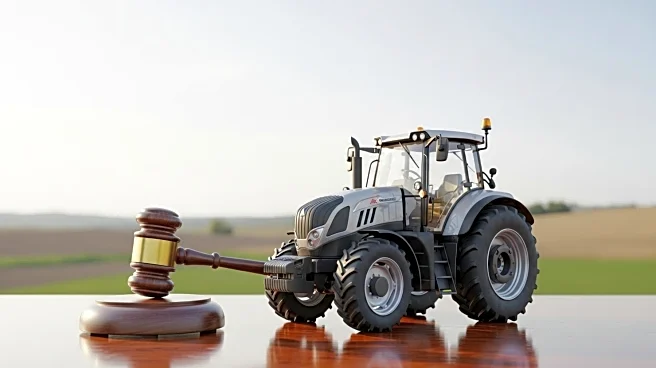What's Happening?
Harry Hollowell, a 27-year-old from Yeovil, has been ordered by Bristol Crown Court to pay over £300,000 in compensation related to handling stolen agricultural machinery. Hollowell had previously pleaded guilty to conspiracy to handle stolen goods and was sentenced to three years and two months in prison in December 2023. The recent court decision mandates Hollowell to pay approximately £309,000, with nearly £54,000 allocated to seven victims who did not have their stolen equipment returned. The remaining funds will be directed into the criminal justice system. The case stems from a 2020 investigation by Avon and Somerset police, which uncovered 20 stolen machines at a farm in South Barrow, Somerset. Hollowell was found to have purchased machinery stolen during farm burglaries in West Somerset and Cardiff.
Why It's Important?
This ruling highlights the significant impact of agricultural theft on the farming community, which already faces numerous challenges. The compensation provides some relief to the victims, acknowledging the financial and emotional toll of the thefts. The case underscores the importance of law enforcement efforts in combating rural crime and the role of the judicial system in ensuring justice and restitution for affected parties. The decision also serves as a deterrent to potential offenders, emphasizing the legal consequences of engaging in such criminal activities.
What's Next?
The compensation process will proceed, with victims receiving their allocated funds. Law enforcement agencies may continue to monitor and investigate similar cases to prevent future occurrences. The farming community may seek further support and security measures to protect against theft. Additionally, the criminal justice system may review and enhance strategies to address rural crime more effectively, potentially influencing policy changes or resource allocation.
Beyond the Headlines
The case raises broader questions about the vulnerability of rural areas to crime and the need for improved security measures. It also highlights the ethical considerations of handling stolen goods and the responsibility of individuals to ensure their business practices do not contribute to criminal activities. Long-term, this case may influence cultural attitudes towards crime in rural communities and encourage greater collaboration between farmers and law enforcement.









